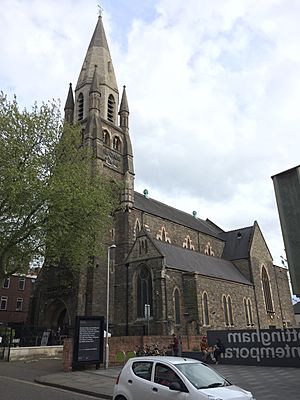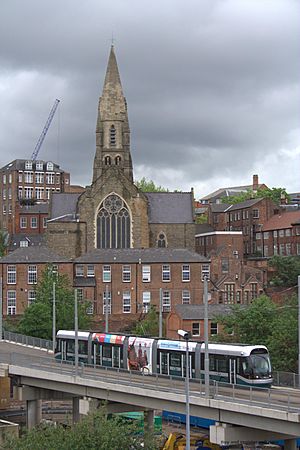High Pavement Chapel facts for kids
Quick facts for kids High Pavement Unitarian Chapel |
|
|---|---|

Unitarian Chapel on High Pavement, now the Pitcher and Piano public house
|
|
| OS grid reference | SK 57521 39618 |
| Country | England |
| Previous denomination | Unitarian |
| Architecture | |
| Heritage designation | Grade II listed |
| Architect(s) | Stuart Colman |
| Completed | 1876 |
| Closed | 1982 |
The High Pavement Chapel is an old church building located in Nottingham, England. It is no longer used as a church. Today, it is a popular place called the Pitcher and Piano public house. The building is very important historically, so it is listed as a Grade II listed building. For most of its history, it was a Unitarian place of worship.

Contents
History of High Pavement Chapel
In August 1662, a law called the Act of Uniformity made it difficult for some ministers to preach. Three ministers in Nottingham, John Whitlock, William Reynolds, and John Barret, had to leave their churches. They continued to preach secretly in homes around Nottingham.
This led to the creation of a permanent chapel on High Pavement in 1690. By 1735, the people who worshipped there became known for their liberal ideas. In 1802, they officially became a Unitarian church.
Changes and New Buildings
In 1758, a disagreement caused some members to leave and start a new chapel. However, they came back together in 1775. The original chapel building was greatly rebuilt in 1805.
Later, in 1864, the congregation opened another church called Christ Church, Peas Hill. This church stayed open until 1932.
The building you see today was finished in 1876. It was designed by an architect named Stuart Colman. This building was used by Unitarians until 1982. After that, it became the Nottingham Lace Museum, but it didn't stay open for long. Then, it was changed into the Pitcher and Piano public house, which it is today. The Unitarian community in Nottingham now meets at a different location nearby.
Beautiful Stained Glass Windows
The chapel has some amazing stained glass windows. These windows tell stories and add beautiful colors to the building.
- The East window was made in 1904 by Morris & Co.. It was designed by Philip Burne-Jones.
- The North aisle has a special window from 1925 that remembers soldiers from the war. It was made by Kempe & Co.
- There is also a window from 1906 that honors the Sunday School. This one was created by Henry Holiday.
- The North transept has a window from 1890 made by H Enfield.
See also
- Listed buildings in Nottingham (Bridge ward)
 | Jewel Prestage |
 | Ella Baker |
 | Fannie Lou Hamer |

